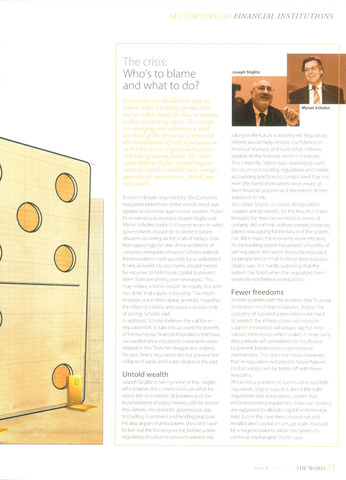The crisis:
Who's to blame
and what to do?
FINANCIAL INSTITUTIONS
government intervention, thank you
Untold wealth
Fewer freedoms
A recent debate organised by The Economist
magazine pitted two of the world's most out-
spoken economists against one another. Nobel
Prize-winning economists Joseph Stiglitz and
Myron Scholes couldn't disagree more on what
governments should do to prevent future
disasters occurring on the scale of today's crisis.
Not surprisingly for one of the architects of
complex, deregulated finance, Scholes defends
the innovations made possible by an unfettered
financial world. He says banks should merely
be required to hold more capital to prevent
them from becoming over-leveraged. This
may reduce a bank's return on equity, but with
less debt, that equity is less risky. Too much
leverage, or too little capital, generally magnifies
the effect of a shock, and causes a vicious circle
of selling, Scholes said.
In addition, Scholes believes the call for re-
regulation fails to take into account the benefits
of the numerous financial innovations that have
succeeded since regulatory constraints were
relaxed in theThatcher-Reagan era. Indeed,
he says, heavy regulation did not prevent the
collapse of banks and broker-dealers in the past.
Joseph Stiglitz is having none of this. Stiglitz,
who blames the current crisis on what he
terms the dishonesty of bankers and the
incompetence of policy makers, calls for stricter
regulations on corporate governance, pay
(including incentives) and lending practices.
He also argues that taxpayers shouldn't have
to bail out the banking sector, before a new
regulatory structure to prevent wanton risk-
Joseph Stiglitz
Myron Scholes
taking in the future is introduced. Regulatory
reform would help restore confidence in
financial markets and curb what Scholes
regards as the financial sector's 'creativity'.
This creativity, Stiglitz says, was largely used
to circumvent existing regulations and create
accounting practices so complicated that not
even the banks themselves were aware of
their financial position and the extent of their
exposure to risk.
Yes, states Stiglitz, of course deregulation
created untold wealth, for the few, but it also
brought the financial world to its knees. It
certainly did not help ordinary people, those tax
payers now paying for the failure of the system,
nor did it make the economy more efficiënt.
As the banking system has proved unworthy of
self-regulation, the sector should be regulated
by people less in thrall to those they regulate,
Stiglitz says. It is hardly surprising that the
system has failed when the regulators them
selves do not believe in regulation.
Scholes counters with the assertion that financial
innovation must lead to failures. And as the
outcome of successful innovations are hard
to predict, the infrastructure necessary to
support innovation will always lag the inno
vations themselves, which makes it more likely
that controls will sometimes be insufficiënt
to prevent breakdowns in governance
mechanisms. This does not mean, however,
that re-regulation will prevent future failures.
Or that society will be better off with fewer
freedoms.
This is nota question of too much ortoo little
regulation, Stiglitz says, but about the right
regulations and a regulatory system that
enforces existing regulations. Financial systems
are supposed to allocate capital and manage
risks, but in this case they created risk and
misallocated capital on a huge scale. It would
be a huge mistake to allow this system to
continue unchanged, Stiglitz says.
ISSUE 18
THE WORD

